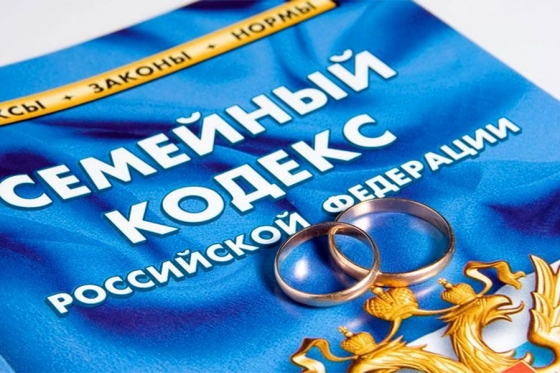Responsibility of spouses for obligations is a complex topic, it is associated with numerous disputes in court. Until now, there is no unambiguous application of the norms of the law on the obligations of husband and wife, understanding of the impact of the debts of one of them on the property status of the other.
Normative base
The Family Code (IC of the Russian Federation) governs the particular property status of spouses. At the same time, it is not the only normative act; the provisions of the Civil Code (CC) should be taken into account.
How is spouses' liability for obligations regulated? Family law has priority over the Civil Code, which applies if there is a gap in the UK. The norms of the code do not apply in principle if they do not correspond to the essence of family relations.

There are also explanations of the Armed Forces of the Russian Federation on the application of the current legislation, but they are not always enough, and from time to time the court draws attention to this topic in practice reviews. Similar studies are carried out by courts at the level of subjects.
Features of the relationship of spouses
The stamp in the passport cannot be called a mere formality. New rights and obligations arise, and they are not limited to material aspects. Much is determined by moral principles. On the one hand, personal freedom remains, including in the acquisition of obligations, on the other, a duty arises to take care of the well-being of the whole family. If, for example, one spouse is sick, the second is obliged to render him all kinds of help. This implies a duty to maintain each other.
The ratio of personal and general
Prior to the marriage, a person is personally liable only for his obligations. He has no responsibility for other people's actions. From the moment a marriage is registered, the situation changes. There are rights to property, general obligations.
Other may take place at the conclusion of a marriage contract. He must be certified by a notary. The beginning of its action is tied to the registration of marriage.

The contract may be signed by the spouses before marriage or after. The law gives the right, through its conclusion, to change the system of property relations in marriage, but this is still rare in Russia. And the responsibility of spouses for obligations in most cases is regulated by the norms of the law, and not by agreement. This must be taken into account.
The concept and essence of the liability of spouses for obligations
Obligations are relations in which the parties are obliged to fulfill or refrain from taking actions and accept execution or counter actions, respectively. One side has the right to demand, and the second - the obligation of performance. Responsibilities include making payments, transferring property, providing services, etc.
A somewhat simplified form of explanation, since there are always mutual rights and obligations, even in a loan agreement. Perhaps a rare exception is perhaps a deed of gift.
Responsibility - the negative consequences of violation of the conditions of obligations or evasion of their fulfillment. Simply put, the guilty party can be fined, deprived of property, apply other measures during enforcement proceedings in the form of restrictions on travel abroad, the right to drive vehicles, etc.

The peculiarity of the position of the spouses is the uncertainty of whether the obligations are general or personal. The second spouse may not formally take part in a transaction or other event, but it will also affect him.
Commitment groups
Law and practice distinguish two groups of obligations: personal and general. The first group is closely related to the identity of one of the spouses and does not formally impose any obligations or restrictions on the second. The second group includes both husband and wife as participants. One of them may not even take part in the transaction or other events.
Personal obligations
At the same time, liability is practiced for both personal and general obligations. For personal it is characteristic:
- appeared before the registration of family relations;
- arose during marriage, but aimed at meeting personal needs, and does not concern family members;
- causing harm to one of the spouses;
- labor relations;
- imposing a burden on the property of one of the spouses;
- evasion or refusal to pay child support.
Are common
The responsibility of spouses for each other's obligations arises from actions in the interests of the whole family. The initiative may come from either one or both. In any case, they both become debtors:
- the obligation arises while participating in the contract, causing damage;
- one family member entered directly into the legal relationship, but the benefit was received by all;
- encumbrance imposed on the common property of the spouses;
- harming common children.
Joint responsibility
How is liability of spouses regulated? Two basic rules apply. The first - the presence of marriage, as described above, does not negate personal responsibility. And a penalty is imposed on the property of one of them.
If personal property is not enough to pay off a debt, then the recovery of the missing part is imposed on the share of the total that would be transferred to the debtor when it is divided.
What is joint liability? It enables the creditor or the person entitled to claim to recover the debt from several debtors at the same time. This happens with the common property of the spouses if unfulfilled obligations arise.

The most striking example is loans taken by one of the spouses. The subject of clarification is the determination of what the money was spent on: for the acquisition of property or needs for the whole family or only the debtor-spouse.
If there is not enough common property, the recovery is already carried out in respect of personal property of both the husband and wife.
Scope of Responsibility
Procedural laws and regulations on enforcement proceedings contain a list of objects that citizens are not deprived of due to non-fulfillment of obligations. For example, the only house and the plot on which it is located. Real estate must be owned.
If the house or land is in a mortgage, they can be taken away in case of non-payment of debt on the loan.
The entire list of property of citizens considered to be inviolable is specified in article 446 of the Code of Civil Procedure of the Russian Federation.

If a penalty is imposed on the common property (house, land, apartment, vehicles) or even arrest, the second spouse has the right to ask the court to allocate a share.
If money or property is acquired as a result of criminal activity, a penalty is imposed on the common property or part thereof, depending on the amount indicated by the court.
What are creditors entitled to?
If spouses enter into, change, or terminate a prenuptial agreement, the debtor spouse must inform creditors of this fact. If there was no message, responsibility arises before the creditors on a common basis, the provisions of the marriage contract do not affect the fulfillment of obligations.
Also, creditors have the right to ask the court to change the terms or terminate the marriage contract if a significant change in circumstances occurs.
Litigation of liability of spouses for obligations
Disputes related to the obligations of the husband and wife are most often considered by the courts in connection with credit relations. In the case of a mortgage, everything is clear enough.Before completing the transaction, banks are asked to provide the consent of the second spouse, or he directly takes part in the acquisition of housing. The second option is considered by banks to be more attractive. Mortgage debt in the event of a divorce is distributed in proportion to shares of property previously considered common.

Consider another example of judicial practice on the liability of spouses for obligations.
The plaintiff filed a lawsuit against a woman who had previously borrowed money from him for the purchase of goods in connection with the implementation of common projects. Subsequently, the debt was not repaid.
At the time the debt arose, the defendant was married, and the plaintiff asked the ex-husband to also be recognized as the defendant.
The Armed Forces of the Russian Federation explained in this case that the obligation is considered to be general if initiated by one spouse, but the profit received is aimed at the needs of the whole family, and not just one.
The lower courts based their conclusions on the presumption of consent of the second spouse to acquire new obligations, as happens with the disposal of common property. According to the panel, the presumption does not apply to general debts. And the court did not clarify the purpose of the loan, whether the money was spent on the needs of the family, and not just the defendant.
The listed errors turned out to be enough for the case to be sent for a new consideration.
Finally
The responsibility of spouses for general and personal obligations arises for various reasons.
Obligations are considered common if funds or property are spent or acquired for the needs of the whole family.

Personal obligations are considered if the debt arose prior to the registration of the marriage relationship. Acquisition in marriage is considered personal if spent on personal needs and has not affected family members in any way.
We also note the significant difference between the emergence of common ownership and obligations. Acquired property in marriage is considered common, with the exception of rare exceptions. Judges often evaluate obligations in this way.
